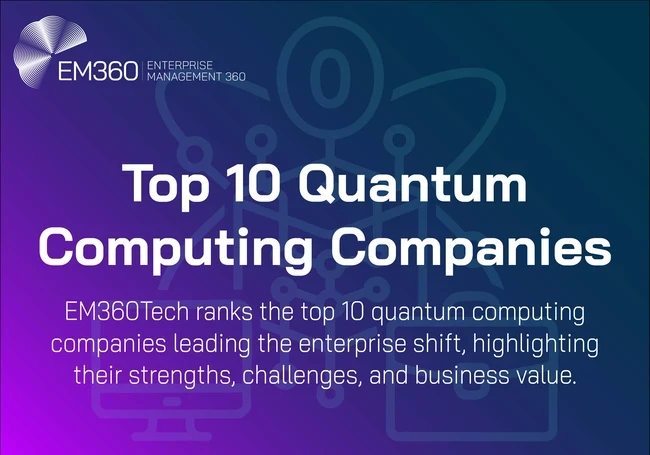Quantum computing is moving from science labs to enterprise strategies in 2025. Tech leaders in banking, pharmaceuticals, logistics, and government are exploring quantum’s potential to solve problems beyond the scope of classical computers.
As quantum moves out of the lab, a small group of vendors are setting the pace in hardware and cloud delivery. Their progress can create competitive advantage for early adopters, and it also introduces new risk that leaders need to manage.

Why Quantum Computing Matters for Enterprises in 2025
Quantum targets problems that push past classical high-performance computing. The promise is faster optimisation, simulation, and machine learning for work such as drug discovery, supply chain planning, and financial risk modelling. In 2025 most programmes are still research or pilot phase, but the topic has become a live strategic issue.
In a survey of more than 900 quantum professionals, over half said progress is faster than expected and 40% expect quantum systems to outperform classical ones on selected workloads within five years. At the same time, the risks are clearer, so leaders are building plans for value creation and for mitigation in parallel.
One widely cited concern is post-quantum cryptography: today’s quantum machines can’t break encryption, but harvest-now, decrypt-later attacks have begun as hackers stockpile encrypted data, anticipating future quantum decryption capabilities. Gartner projects that by 2029, advances in quantum will render common encryption algorithms like RSA unsafe, with them becoming fully breakable by 2034.
Governments have moved from theory to action. With NIST’s quantum-resistant standards finalised in 2024, enterprises now have a defined path to migrate. The disciplined move is to build post-quantum cryptography into security and supplier roadmaps to protect data and dependencies.
The upside is material: McKinsey sizes the opportunity at $1.3 trillion by 2035, with step-change gains expected in materials science, drug discovery, and AI. Already, companies using today’s nascent quantum systems have reported promising results.
For example, real-world pilots have used quantum annealing to optimize mobile networks and workforce scheduling beyond classical methods. Over 20 million problems have been run on D-Wave’s quantum cloud by enterprise users, with usage jumping 134% in a recent six-month period – a sign that businesses are ramping up experimentation.
Practical leaders are running focused pilots, choosing credible partners, and building internal skills. Doing the work now positions their organisations to capture upside and manage exposure instead of scrambling later. Quantum matters in 2025 because progress is accelerating, the opportunity and the risk are real, and capability takes time to build.
Key Trends Shaping the Quantum Computing Landscape
Several key trends are defining enterprise quantum computing in 2025:
March toward fault tolerance
Vendors are driving error rates down and aiming for logical qubits, the foundation for sustained, reliable computation. Vendors are reducing errors and targeting logical qubits. IBM’s Quantum Starling plans call for a fault-tolerant system by 2029 with 200 logical qubits executing 100 million reliable operations. Google’s Willow chip shows exponential error reduction as systems scale, and Amazon’s Ocelot uses cat qubits that cut error-correction overhead by up to 90%. The direction of travel is clear: lower errors, higher reliability, closer to business value.
Quantum cloud and hybrid integration
Most enterprise work happens via quantum cloud services, stitched into classical HPC. Hybrid is proving practical: IonQ + AWS + NVIDIA + AstraZeneca reported a 20× speed-up on a chemistry workflow by pairing a quantum QPU with GPUs. Azure orchestrates quantum subroutines alongside classical code, and Amazon Braket centralises access to multiple hardware types. This lets teams pilot use cases without capex.
Diverse qubit technologies and innovation

Inside Next-Gen Compute Design
See how choices from ISA to memory hierarchy enable GPUs, neuromorphic chips and quantum systems to surpass classic CPU-centric designs.
The race spans superconducting, trapped ion, and photonic systems, each with trade-offs in speed, fidelity, and scale. Photonics promises room-temperature operation at terahertz-level rates, while D-Wave fields 5,000+ annealing qubits for optimisation. Microsoft is pursuing topological qubits; Intel advances silicon spin qubits on 300 mm wafers. Recent milestones include Quantinuum at 99.9% two-qubit fidelity, Rigetti reaching 99.5% with halved gate errors, and NTT demonstrating optical qudit operations beyond prior success limits. Sensible enterprises back more than one path via the cloud.
Enterprise-ready offerings and ecosystem growth
Focus is shifting from raw qubits to uptime, integration, and workflows. D-Wave Advantage2 ships with 99.9% SLA on Leap and on-prem options. IonQ Forte Enterprise fits standard racks. Quantinuum Helios brings hardware-as-a-service with Nexus to manage hybrid workloads. Tooling is maturing too, from Qiskit and Cirq to specialised libraries and integrators. Teams can engage at the API and application layer, not just the physics layer.
Quantum security and readiness initiatives
Post-quantum cryptography is now an executive priority. Organisations are inventorying crypto, testing quantum-safe algorithms, and adopting services like Quantinuum Quantum Origin for high-entropy keys. National programmes and DARPA challenges are accelerating both compute and cryptanalytic capabilities. Quantum has moved onto risk registers and multi-year IT roadmaps, with training and migration plans underway.
The 2025 Shortlist — 10 Companies Leading Enterprise Quantum
Let’s examine the ten companies at the forefront of enterprise quantum computing, what they offer, their pros and cons, and where each might fit for business use.
Amazon Web Services (AWS) Quantum
AWS makes quantum accessible through Amazon Braket, a single cloud entry point to multiple hardware types. In 2025 it unveiled Ocelot, a cat-qubit prototype designed to cut error-correction overhead by up to 90%, signalling a longer-term push toward fault tolerance.
Enterprise-ready features
Braket provides a developer-friendly stack with Python SDKs, managed notebooks, scalable simulators, and Hybrid Jobs to run quantum subroutines alongside EC2 or serverless workflows. Teams can trial superconducting, trapped-ion, photonic, and annealing systems from partners in one place, including the IQM Emerald 54-qubit device.
Security and compliance align with AWS standards, with regional data residency and identity controls. An extensive partner network and ProServe help with use-case discovery, proof-of-concepts, and integration into existing data and ML pipelines.
Pros
Building Hybrid Quantum Systems
Explore the tech stack behind quantum adoption, from cloud access and NISQ algorithms to integrating PQC and hybrid workflows into core systems.

- One platform to access superconducting, trapped-ion, photonic, and annealing devices.
- Familiar AWS tooling and managed notebooks shorten onboarding.
- Hybrid workflows combine QPU runs with EC2 and serverless services.
- Active R&D pipeline with Ocelot targeting large reductions in error-correction overhead.
- Global security, compliance, and enterprise support already in place.
Cons
- No customer access to Amazon-built hardware yet, with Braket reliant on partner devices.
- Costs can build quickly on larger runs, and there’s no option to run workloads on-site to spread spend more evenly.
- The wide choice of devices can also add complexity, with most teams still needing specialist skills to pick the right back end and interpret results.
Best for
Organisations already using AWS that want straightforward pilots, side-by-side hardware trials, and hybrid workflows. It’s a good fit for R&D teams exploring different qubit types with moderate budgets, prioritising breadth and integration today while Amazon’s in-house hardware develops.
D-Wave Systems
D-Wave is the pioneer of commercial quantum computing and the only provider of quantum annealing. Its Advantage2 system (2025) packs 4,400+ qubits with 20-way Zephyr connectivity and has shown wins on optimisation instances that strain classical supercomputers. D-Wave offers a full stack, from hardware to the Ocean SDK and services that map real business problems to annealing.
Enterprise-ready features
The Leap cloud delivers 99.9% availability across 40+ countries with hybrid solvers that mix classical and quantum methods. These solvers accept problems with up to 1 million variables, letting teams test at realistic scales without managing infrastructure. For tighter control, Advantage2 can be deployed on-prem in a data-centre footprint drawing about 12.5 kW.
Tooling is mature. Python libraries and problem templates speed formulation for routing, scheduling, and portfolio tasks. D-Wave also supports engagements to tune models. The company is exploring a gate-model prototype, but production strength today is annealing.
Pros
- Solves discrete optimisation now on large embedded problem sizes.
- Leap cloud is stable, global, and easy to onboard.
- On-prem deployment and SOC 2 Type 2 compliance fit enterprise IT.
- Advantage2 improves connectivity and reduces noise versus prior gens.
- Strong services help translate business constraints into QUBO models.
Cons

Betting on Quantum Uncertainty
Boards weigh billions in quantum spend amid unclear timelines, fragmented benchmarks and a talent gap that could decide early winners.
- Annealing is specialised and does not run general gate-based algorithms.
- Solution quality can vary and is not always better than top classical heuristics.
- QUBO/Ising formulation has a learning curve for most teams.
- Competes with fast-improving classical and “quantum-inspired” optimisers.
- Gate-model path is early and may not offset others’ gate-based progress.
Best for
Organisations with hard, recurring optimisation problems in logistics, manufacturing, and finance that want results today. A practical entry point for pilots where even small gains move the needle, with the option to bring systems on-prem when required security or latency applies.
Google Quantum AI
Google leads quantum R&D with superconducting processors and headline milestones. The Willow chip (late 2024) demonstrated exponential error reduction as systems scale and completed a task estimated at 10^25 years classically in under 5 minutes. Leadership expects useful, beyond-classical applications could be about five years out, and Google’s open-source tools (Cirq, TensorFlow Quantum) shape industry practice.
Enterprise-ready features
There is no public Google quantum cloud. Access to hardware is via select collaborations and research programmes. Enterprises benefit indirectly through open-source software, papers, and algorithm work that inform roadmaps and skills.
Google collaborates with labs and a small number of partners and supports domain work in chemistry and optimisation through published methods. The Alphabet ecosystem also seeds adjacent capabilities, such as post-quantum security via spin-outs.
Pros
- Consistent firsts in error correction and beyond-classical demonstrations.
- Deep talent and resources sustain long-term progress.
- Strong open-source stack lowers barriers for developers.
- Clear AI and quantum research synergies.
- High-performance hardware with fast gates and high fidelities.
Cons
- No commercial cloud access for enterprises today.
- Unclear timeline for broad service availability.
- Rivals offer hands-on access now via IBM, Azure, and AWS.
- Superconducting scaling still faces wiring and cryogenic complexity.
- Smaller enterprise ecosystem around Google hardware and services.
Best for
Research-led organisations wanting frontier collaborations and teams building skills on Cirq and hybrid methods ahead of future access. Most enterprises will watch Google’s breakthroughs and run pilots on IBM, Azure, or AWS while preparing to engage when Google opens its platform.
IBM Quantum
When Quantum Meets NVIDIA GPUs
SEEQC and NVIDIA target tightly coupled quantum–GPU systems, signaling a pivot toward native quantum AI for enterprise workloads.

Alt text: Illustration of IBM’s Quantum Data Center in Poughkeepsie, New York, showing future quantum systems. IBM Quantum System Two (2025) supports 1,000+ physical qubits and 15,000+ quantum gates. IBM Quantum Starling (2029) aims for 200 logical qubits and 100 million quantum gates. IBM Quantum Blue Jay (2033+) targets 2,000 logical qubits and 1 billion quantum gates. The image depicts rows of modular quantum systems with labeled milestones and human figures for scale.
IBM is the most enterprise-oriented quantum provider, with public cloud access since 2016 and a clear roadmap. Milestones include 127-qubit Eagle (2021), 433-qubit Osprey (2022), plans for 1,121-qubit Condor, and a modular System Two. The Quantum Starling vision targets 200 logical qubits and fault tolerance by 2029. In 2023, IBM showed “utility” with a circuit solved in 2.2 hours versus 112 hours classically (~50× faster with mitigation). Qiskit anchors a large developer community and a 200+ member network.
Enterprise-ready features
IBM Cloud exposes multiple processors with transparent metrics and reserved access to premium devices, backed by SLAs. Qiskit Runtime brings hybrid execution close to the hardware, while Composer and domain libraries (Finance, Nature, etc.) shorten time to first results. Error-mitigation tooling enables deeper circuits on today’s noisy devices.
For sensitive work, IBM supports private instances and has deployed System One on-prem for clients in Germany and Japan. In 2025, System Two debuted with RIKEN alongside supercomputing resources. Training, forums, and IBM Consulting round out end-to-end support from use-case discovery to pilot delivery.
Pros
- Broadest accessible hardware portfolio at meaningful scales.
- Qiskit and a large community accelerate learning and hiring.
- Strong focus on error mitigation and operational reliability.
- Full-stack support from consulting to runtime services.
- Roadmap delivery builds confidence toward fault tolerance.
Cons
- No proven advantage yet on practical business workloads.
- Premium access often requires paid programmes and multi-year commitments.
- Superconducting systems demand complex cryo and control infrastructure.
- Competes with neutral clouds offering multi-vendor access.
- Still requires scarce quantum skills for serious work.
Best for
Large enterprises committing to a multi-year quantum plan with hands-on access, robust tooling, and a clear vendor roadmap. A strong fit for finance, automotive, energy, and government programmes that need mature support, private environments, or eventual on-prem systems.
Intel Quantum
Intel approaches quantum as a chipmaker. It builds silicon spin qubits on 300 mm wafers, aiming for tiny, uniform devices made with standard CMOS tools. Milestones include the Tunnel Falls 12-qubit test chip, the Horse Ridge cryogenic control chip, and reported ~95% wafer-level yields on spin-qubit devices.
Enterprise-ready features
There is no Intel quantum service to use today. Intel works through research collaborations and offers the Intel Quantum SDK so teams can design and simulate for a future spin-qubit architecture.
Longer term, Intel’s path points to dense, manufacturable qubits that co-locate with classical control, making quantum look more like an accelerator you fit into existing infrastructure.
Pros
- Silicon process and 300 mm fabrication offer a credible scaling path.
- Very small qubits support high-density layouts and potential on-package integration.
- Strong progress on control electronics with Horse Ridge.
- Deep ecosystem and lab partnerships accelerate learning and standards.
- Potential cost benefits if devices ride mature CMOS lines.
Cons
- No hardware that enterprises can use directly today.
- Multi-qubit control and high-fidelity two-qubit gates at scale remain unproven.
- Others may reach useful gate counts sooner with different tech.
- Integrating quantum and classical on one package adds design risk.
- Smaller developer community versus Qiskit and Cirq ecosystems.
Best for
R&D groups and strategic partners taking a long view on scalable, manufacturable quantum. A good fit for organisations that want early insight into silicon spin qubits and to prepare for a future where quantum behaves like a standard data centre accelerator.
IonQ
IonQ builds trapped-ion systems known for high fidelity and all-to-all connectivity. Its Forte line reports #AQ 35–36 on public benchmarks, reflecting strong effective performance at current qubit counts, with a roadmap toward higher #AQ targets.
Enterprise-ready features
IonQ is available through AWS Braket, Azure Quantum, and its own cloud, so teams can run jobs inside existing environments. Forte Enterprise brings a rack-based system that can be hosted on site, with integrations to CUDA-Q and common Python frameworks.
Professional services and partner programmes help map workflows in chemistry, optimisation, and ML, and the ecosystem supports hybrid pipelines that pair QPUs with GPUs.
Pros
- High fidelity extends algorithm depth before errors dominate.
- All-to-all connectivity reduces circuit depth and simplifies mapping.
- Accessible on major clouds with straightforward APIs and SDKs.
- Rack-based option enables dedicated or on-prem capacity.
- Active partnerships across pharma, finance, aerospace, and public sector.
Cons
- Gate speeds are slower than superconducting systems.
- Throughput per QPU can be limited by single chain execution.
- Younger company with less enterprise legacy than incumbents.
- Strong trapped-ion competition from other vendors.
- Runtime costs can be high for larger experiments.
Best for
Teams that need high-fidelity qubits for meaningful NISQ-era work in chemistry, optimisation, or ML, and want easy cloud access now with a path to dedicated capacity later.
Microsoft Azure Quantum
Microsoft pursues a dual track: a long-term bet on topological qubits and a broad Azure Quantum cloud that aggregates leading hardware and quantum-inspired solvers. Its software stack (Q#, resource estimators, developer tools) is built for scaled, error-corrected futures.
Enterprise-ready features
Azure Quantum provides a unified interface to IonQ, Quantinuum, Rigetti, and quantum-inspired optimisation that runs on classical Azure compute. This lets teams compare real QPUs with powerful classical heuristics in the same workflow.
Tight Azure integration brings identity, security, data services, and CI/CD patterns, while Q# and estimators help architects plan when and how a workload could benefit from fault-tolerant machines.
Pros
- One platform to access multiple QPUs and quantum-inspired solvers.
- Enterprise-grade security and governance through Azure.
- Tooling for resource estimation supports long-term planning.
- Strong developer ecosystem and familiar dev tools.
- Clear pathway to hybrid workflows across Azure services.
Cons
- Microsoft’s own qubit hardware is still experimental.
- Capacity and performance depend on partner devices.
- Harder sell for organisations standardised on other clouds.
- Q# adds a language to learn when Python may suffice short term.
- No headline quantum-advantage result owned by Microsoft yet.
Best for
Azure-aligned organisations that want easy access to multiple hardware back ends and immediate value from quantum-inspired optimisation, while building skills and roadmaps for a fault-tolerant future.
NTT (Nippon Telegraph and Telephone)
NTT focuses on photonic and optical quantum technologies, from cloud-access optical processors to the Coherent Ising Machine (CIM) for optimisation. In 2024, with RIKEN and Fixstars, it launched a claimed first general-purpose optical quantum computer via the cloud, using time-division multiplexed light pulses that operate near room temperature at very high rates. NTT also advances photonic qudits, quantum networking, and QKD.
Enterprise-ready features: Access today is selective. The optical platform is available to eligible research partners, which suits teams exploring continuous-variable methods or ultra-high-rate workloads. NTT’s CIM offers a quantum-inspired route to optimisation now, delivered as a service or through engagements.
Longer term, photonics points to simpler deployment. Room-temperature operation, fibre links, and NTT’s carrier footprint make networked quantum and quantum-secure communications credible paths, with QKD pilots and integration support through NTT’s global services.
Pros
- Photonic systems promise room-temperature operation and very high repetition rates.
- Deep strength in telecoms, networking, and quantum-secure communications.
- Practical optimisation via CIM delivers value without waiting for fault tolerance.
- Strong Japan-anchored ecosystem with global academic and industry links.
- Clear vision for modular, networked quantum infrastructure.
Cons
- Broad commercial access is limited and mostly research-led today.
- Error correction for photonics is early, with scale and reliability still unproven.
- Competes with established cloud platforms that offer immediate hands-on QPUs.
- Software ecosystem and developer tooling are less mature than major peers.
- Activity is concentrated in Japan, which can add engagement friction for some teams.
Best for
Organisations exploring photonics, quantum networking, or quantum-secure communications, and enterprises running optimisation at scale that can benefit from CIM while preparing for optical QPUs.
Quantinuum
Formed from Honeywell Quantum Solutions and Cambridge Quantum in 2021, Quantinuum combines top-tier trapped-ion hardware with a strong software stack. Its H-Series systems have led on fidelity and Quantum Volume, and it has demonstrated multiple logical qubits with error rates far below physical qubits. Products span hardware access, the TKET compiler, InQuanto for chemistry, and Quantum Origin for cryptographic keys.
Enterprise-ready features
Enterprises can use H1/H2 via Azure Quantum or direct APIs, or deploy dedicated systems in select cases. Hardware-as-a-Service options and the upcoming Helios (H3) aim to make capacity more flexible, while Nexus streamlines hybrid workflows and job management.
For immediate wins, Quantum Origin delivers verifiable high-entropy keys through an API, and InQuanto accelerates materials and chemistry studies. TKET optimises circuits across back ends, squeezing more value from each run.
Pros
- Class-leading trapped-ion fidelity, depth, and demonstrated logical qubits.
- Full-stack capability from hardware to compilers and domain software.
- Ready-to-use products such as Quantum Origin create value now.
- Strong partnerships across finance, pharma, energy, and government.
- Focus on error correction positions customers for fault-tolerant scale.
Cons
- Premium systems with access primarily via paid programmes or contracts.
- Brand awareness can lag larger household names.
- Direct comparison with other ion-trap leaders can complicate vendor choice.
- Limited low-end devices for casual exploration.
- High-end focus narrows the entry path for small teams and budgets.
Best for
Enterprises that want high-fidelity trapped-ion performance, domain software for chemistry or security, and a partner that can support from first pilots to advanced, error-corrected roadmaps.
Rigetti Computing
Rigetti builds superconducting QPUs with a modular, multi-chip strategy. Its Ankaa-3 system (84 qubits) reports ~99.5% median two-qubit fidelity, a step up from prior generations. Rigetti offers cloud access, open tooling (Quil, pyQuil), and has delivered on-prem systems for government labs.
Enterprise-ready features
Access comes via Rigetti QCS or through clouds such as AWS Braket, with hybrid execution that keeps quantum and classical code in tight loop for VQE, QAOA, and similar methods. Open, low-level control supports custom pulses and error-mitigation work for advanced users.
Rigetti supports dedicated deployments for secure environments and continues to tile chiplets for scale, aiming to raise qubit counts while maintaining the newer fidelity levels.
Pros
- Modular chiplet architecture offers a credible path to larger systems.
- Developer-friendly stack with granular control and clear APIs.
- Hybrid workflows are first-class and well suited to near-term algorithms.
- Available on AWS Braket and via Rigetti’s own cloud.
- Willingness to deploy on-prem for qualified customers.
Cons
- Smaller player with more volatility than large incumbents.
- Historical variability in uptime and errors, now improving with Ankaa-3.
- Qubit counts trail certain leaders, with no headline advantage yet.
- Ecosystem and community are smaller than IBM or Azure stacks.
- Competes with better-funded platforms moving quickly on scale.
Best for
Teams that want hands-on superconducting hardware with strong hybrid programming, access through AWS, and the option for deeper low-level control, including research groups and secure environments that may need dedicated systems.
How Enterprises Should Evaluate Quantum Vendors
Choosing a quantum partner is a strategy call, not a gadget pick. Use this checklist to balance technical reality with business fit.
Roadmap and delivery
Favour vendors with a clear plan and a record of hitting it. IBM’s public path from 127 → 433 → 1,121 qubits has arrived broadly on schedule, which builds confidence. Track meaningful breakthroughs as proof of direction, for example Google’s error reduction results and Quantinuum’s logical qubits. Align their timeline with yours. If a vendor targets fault tolerance by 2029, check whether that matches your industry window.
Hardware fit and scalability
Match architecture to workload. For optimisation at large problem sizes, a D-Wave annealer with 5,000+ qubits can be useful now. For circuit algorithms, fewer but higher-fidelity qubits from IonQ or Quantinuum may win. Examine error rates, connectivity, and metrics such as Quantum Volume or algorithmic qubits, then ask for a credible path to scale, including error correction plans.
Software and tooling
Productivity lives in the stack. Look for robust SDKs, simulators, and resource estimators, plus strong documentation. Qiskit and Q# are mature options, while Python interoperability with frameworks like Cirq or PennyLane widens your hiring pool. Third-party ISV support and reference libraries shorten time to first useful result.
Integration and access
Most teams will use the cloud, so check alignment with AWS Braket, Azure Quantum, or Google Cloud. Verify API access, data residency, and identity controls. Hybrid pipelines should let quantum jobs sit inside existing data and ML workflows. If latency or sovereignty matter, confirm dedicated links or on-prem options.
Support and services
Early value depends on enablement. Look for onboarding, training, architectural guidance, and SLAs. D-Wave’s Leap advertises 99.9% availability, which is a useful benchmark for service maturity. Confirm security certifications and who you call when jobs fail or results drift.
Use-case proof
Prioritise vendors with evidence in your domain, or a plan to co-develop a pilot. Ask for references and measurable outcomes, even if they are prototypes. Optimisation, chemistry, and risk are common entry points.
Viability, IP, and cost
Assess financial durability, partnerships, and governance. Clarify IP terms for algorithms and models you build. Understand pricing, whether pay per shot, hourly, or subscription, and ask about volume tiers so costs remain predictable as usage grows.
Most enterprises start with one or two pilots to test these factors in practice, then scale with the partner that proves technical fit, operational reliability, and business value.
Frequently Asked Questions About Quantum Computing Companies
Q1: Who is leading — startups or big tech?
Both. Large firms such as IBM, Google, Microsoft, Amazon, Intel and NTT bring deep R&D and cloud reach. Specialists including D-Wave, IonQ, Quantinuum and Rigetti push specific architectures and features. Many partner with one another and with academia. Leadership is about expertise and delivery, not company size.
Q2: Which company has the most powerful system in 2025?
It depends on the metric. IBM’s roadmap lists 1,121-qubit Condor, with 433-qubit Osprey broadly deployed. D-Wave annealers exceed 5,000 qubits but target optimisation. Quantinuum H2 reports Quantum Volume > 8 million (2^23), and IonQ cites #AQ 36. Google’s Willow executed a beyond-classical task in under 5 minutes that would take an estimated 10^25 years classically. Different benchmarks favour different vendors.
Q3: How do we access these machines?
Mostly via cloud. IBM offers devices through IBM Cloud and the IBM Quantum Network. AWS Braket and Azure Quantum provide access to IonQ, Quantinuum, Rigetti and others. D-Wave Leap connects directly to annealers. You code with SDKs such as Qiskit, Cirq or provider APIs and submit jobs over secure endpoints. If cloud is not viable, limited on-prem options exist from IBM and D-Wave, with Rigetti available for select labs, but most teams should start in the cloud.
Q4: What real applications exist today?
Early, focused pilots. Optimisation: D-Wave has supported traffic, scheduling and portfolio pilots, including Volkswagen’s taxi routing trial. Chemistry: IBM systems have simulated small molecules; Quantinuum reported a complex reaction workflow with >20× speedup. Finance: Banks have explored option pricing and portfolio construction on IBM and D-Wave. Security: Quantum Origin provides high-entropy keys, and operators have run QKD pilots. These are proofs of concept that signal where advantage may land first.
Q5: How far are we from clear business advantage?
A survey of 900+ quantum professionals found 50%+ expect superiority on some workloads within five years. We’ve seen scientific advantage, but business-relevant gains should appear first in niches such as optimisation and chemistry, likely 2025–2027. Gartner warns many current encryption methods could be unsafe by 2029; IBM targets fault tolerance by 2029. The pragmatic path is to experiment and build skills now.
Q6: Annealing vs gate-based — which should we choose?
Annealing (D-Wave) specialises in optimisation, scales to 5,000+ qubits, and can handle large problem instances today. Gate-based (IBM, Google, IonQ, Quantinuum, Rigetti) is general-purpose and the long-term route to broad advantage, but with fewer, higher-fidelity qubits today. Pick annealing for near-term optimisation trials; pick gate-based for chemistry, cryptography, ML and future breadth. Many organisations pursue both and use the best tool per workload.
Final Thoughts: Choose Reliability Over Raw Qubits
Ignore headline qubit counts. What matters in 2025 is reliability, fidelity and an ecosystem your teams can actually use. A smaller number of stable, well-corrected qubits beats a larger, noisy system that stalls real work. Prioritise vendors that show consistent results, strong tooling and a partner mindset over those who only top a spec sheet.
Ask practical questions. Do they deliver 95%+ uptime and meet their roadmap commitments. Do they have case studies that look like your workload. Can your developers be productive on day one with SDKs, simulators and clear documentation. Will they support you with training, security reviews and honest limits, including quantum-inspired options as a bridge.
Real value comes from repeatable gains on real problems. That might be cutting a supply chain run from weeks to hours, every time, or improving key security with quantum-grade randomness across critical systems. Choose partners who help you build that discipline, not one-off stunts.
Progress is accelerating, but steady wins here. Back vendors that favour quality, reliability and integration, and you will be ready to plug quantum into your operations when it counts. For deeper guidance, explore EM360Tech for articles, podcasts and expert briefings on quantum and emerging tech.





Comments ( 0 )